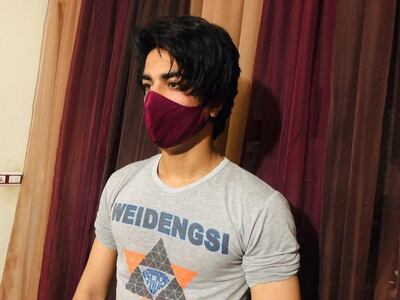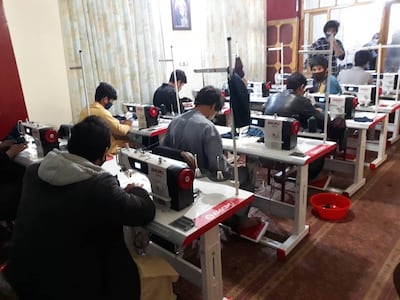As a teenager starting her career as a fashion designer, Rika Sadat was used to working under lockdown during the Taliban’s strict and oppressive rule.
Today, the 40-year-old’s movements are once again restricted as her city Herat – the first epicentre of the coronavirus outbreak in Afghanistan – has been quarantined for the past month.
Growing up as one of six sisters, Ms Sadat was able to finish school with the help of her mother, who took on the responsibility of educating her daughters secretly at home.
“I started crafting and experimenting with different fabrics and designs around the same time,” remembers Ms Sadat, who, after completing studies in fashion design, went on to become one of Afghanistan’s most prominent costume designers, equipping the sets of some of the country’s most famous television shows.
Since the coronavirus outbreak, she has shifted her focus. For now, her fashion business has taken up the production of pure silk masks, distributed throughout Afghanistan, and shipped as far as the United States.
Herat, a northwestern city of about one million people near the Iranian border, has, over the years, become a major silk farming centre. With the start of the coronavirus pandemic, hundreds of thousands of Afghans returning from Iran passed through the city, causing the number of infections to climb quickly.
Afghanistan is nearing 2,000 confirmed coronavirus cases – about 500 of them in Herat – but with limited testing available, estimates of the actual infection rate are hard to determine.
“When the lockdown came into place and fears spread throughout the country, I decided I needed to do something,” Ms Sadat explained. “I hired dozens of people who had lost their jobs due to quarantine regulations, bought silk and instructed my employees to work from home as much as possible.”
Over the past weeks, over forty employees have produced two types of masks - fine silk ones, with a daily production rate of about 1,000; and about 2,000 simple cotton ones each day.
“We have so far sent about 5,000 of them to the United States,” Ms Sadat says proudly, adding that this was in collaboration with the Eneref Institute and Dulles Dynamics.
“The masks are economically viable because they are reusable. They are lightweight and comfortable and you won’t sweat under them.”
Afghanistan’s 35-million strong nation has long been one of sophisticated handicrafts, with boundless resources and quality raw materials such as silk, wool, precious stones and metals.
“The danger is that cheap, low-quality imported goods are quickly replacing quality products handmade in Afghanistan,” Ms Sadat explains. “My business is countering just that. I’m hoping to develop further traditional and indigenous designs and fabrics and bring them to the international market to share a beautiful image of Afghanistan.”
Already battling conflict, economic hardship and a political crisis, the coronavirus pandemic has yet brought another challenge to the war-torn country. Ms Sadat developed her business under the Taliban and says that living in quarantine has reminded her of that time.
“Back then, it was a sort of lockdown for us women only; the difference now is that we’re all asked to stay inside,” she said, joking that at least it was more equal. “But we’ve survived those days and I’m confident we will also get through this pandemic.”



